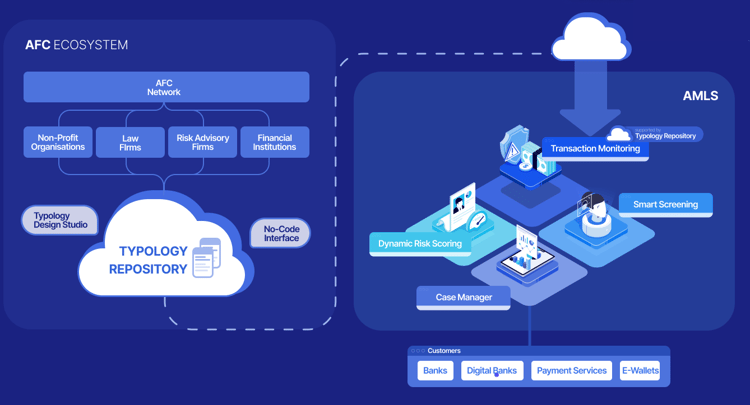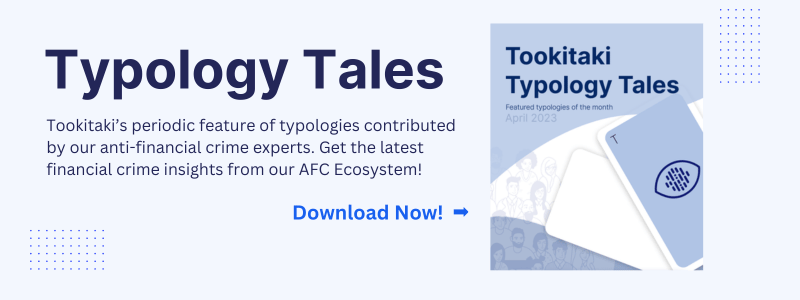How the AFC Ecosystem Enhances AML/CFT Efforts for Thai Businesses
As one of Southeast Asia's largest economies, Thailand has been facing significant challenges in combating money laundering and terrorist financing activities. With its rapidly growing financial sector and increasing adoption of digital payment systems, the country has become a potential target for financial criminals. Thai authorities have implemented several regulatory measures in response to these challenges, including the establishment of the Anti-Money Laundering Office (AMLO) and enacting the Anti-Money Laundering Act (AMLA) and the Counter-Terrorist Financing Act (CFTA). Despite these efforts, financial institutions in Thailand continue to face complex and evolving threats that require advanced solutions to mitigate risks effectively.
In order to protect their reputation, maintain customer trust, and avoid hefty fines or legal consequences, it is essential for Thai financial institutions to have robust AML/CFT measures in place. Effective AML/CFT strategies help institutions comply with local and international regulations and contribute to the global fight against financial crime. Furthermore, strong AML/CFT measures enable financial institutions to understand their customers better and manage risks, thereby facilitating sustainable growth and promoting a stable financial environment.
Tookitaki's Anti-Financial Crime (AFC) Ecosystem is an innovative, comprehensive platform designed to help financial institutions enhance their AML/CFT efforts. By leveraging expert insights and industry collaboration, Tookitaki's AFC Ecosystem offers Thai financial institutions a powerful method to stay ahead of evolving threats and bolster their AML/CFT strategies.
Understanding the AML/CFT Hurdles in Thailand's Financial Sector
Thailand's financial sector has been grappling with various AML/CFT challenges that pose significant risks to the stability and integrity of the country's economy. This section aims to shed light on the unique hurdles that Thai financial institutions face in their ongoing fight against financial crime.
- Diverse and Evolving Threats: Thailand's geographical location, along with its thriving economy, attracts a wide range of financial criminals, including drug traffickers, human smugglers, and terrorist financiers. This diversity of threats requires financial institutions to be agile and adaptive in their AML/CFT efforts.
- High Cash Usage: Despite the growing adoption of digital payment methods, cash remains the dominant mode of transaction in Thailand. The extensive use of cash in the economy makes it more challenging for financial institutions to track and monitor suspicious activities.
- Informal Financial Channels: Thailand is known for its informal financial channels, such as hawala, which money launderers and terrorist financiers can exploit to move funds without detection. These parallel systems can circumvent traditional AML/CFT controls, complicating efforts to combat financial crime.
- Technological Advancements: The rapid adoption of digital banking and payment technologies, including e-wallets and cryptocurrencies, introduces new vulnerabilities that financial criminals can exploit. Financial institutions must stay updated with the latest technological developments and implement robust measures to address the associated risks.
- Regulatory Complexity: Thai authorities have been working to enhance their AML/CFT framework to comply with international standards. During 2019-2022, the Anti-Money Laundering Office (AMLO) issued new regulations and guidelines for reporting entities (REs) to enforce the law more strictly. Thai financial institutions must comply with a multitude of local and international AML/CFT regulations, such as the AMLA, CFTA, and FATF recommendations. Navigating this complex regulatory landscape can be challenging and resource-intensive for financial institutions.
- Limited Access to AML/CFT Expertise: Although the Thai government has made efforts to strengthen AML/CFT competencies, the country still faces a shortage of skilled professionals in this field. Financial institutions may struggle to find and retain the right talent to manage AML/CFT risks effectively.
- Compliance with FATF Recommendations: Thailand is expected to comply with the FATF 40 Recommendations to strengthen its AML/CFT system. The country has faced assessment by the Asia/Pacific Group on Money Laundering (APG) to determine its level of compliance and effectiveness.
By understanding these unique challenges, Thai financial institutions can develop tailored strategies to bolster their AML/CFT efforts and contribute to the global fight against financial crime.
How a Community-based approach can address AML/CFT challenges
A community-based approach to addressing AML/CFT challenges involves collaboration among various stakeholders, including financial institutions, regulators, law enforcement agencies, and other entities in the financial system. This approach aims to enhance the effectiveness of AML/CFT measures and promote financial transparency. While the provided web search results do not specifically discuss a community-based approach, we can infer some benefits of this approach by analyzing the available information:
- Flexibility and adaptability: A community-based approach fosters flexibility and adaptability to the dynamic financial inclusion agenda and the growing understanding of FATF standards that impact financial inclusion and exclusion.
- Promoting innovative solutions: Encouraging collaboration among stakeholders can lead to adopting innovative technology-based solutions that improve AML/CFT measures. This can help both industry and government overcome the challenges associated with the cost-benefit analysis of adopting new technologies for AML/CFT purposes.
- Sharing information and best practices: A community-based approach facilitates information sharing among stakeholders, enabling them to stay updated on emerging AML/CFT trends and challenges. This can help financial institutions adopt more effective strategies to combat financial crime.
- Risk-based supervision: By working together, financial intelligence units, regulators, and other supervisors can better assess risks in the sectors they oversee and adapt their resources accordingly. This enables a more targeted and efficient use of resources in combating money laundering and terrorist financing.
- Strengthening the risk-based approach: In a community-based approach, stakeholders can collaborate to strengthen risk-based AML/CFT measures, such as utilizing adverse media screening to enhance due diligence on ultimate beneficial owners (UBOs).
In summary, a community-based approach can address AML/CFT challenges by fostering collaboration, promoting innovative solutions, sharing information and best practices, implementing risk-based supervision, and strengthening risk-based measures.
Regulatory Compliance and Tookitaki's AFC Ecosystem
Tookitaki is a global leader in financial crime prevention, dedicated to building a safer and more secure world through innovative technology, strategic collaboration, and a distinctive community-based approach. Since its inception in 2015, it has been on a mission to transform the battle against financial crime by dismantling siloed AML approaches and uniting the community through its groundbreaking Anti-Money Laundering Suite (AMLS) and AFC Ecosystem.
The AFC Ecosystem is a community-based platform that facilitates sharing of information and best practices in the battle against financial crime. Powering this ecosystem is our Typology Repository, a living database of money laundering techniques and schemes. This repository is enriched by the collective experiences and knowledge of financial institutions, regulatory bodies, and risk consultants worldwide, encompassing a broad range of typologies from traditional methods to emerging trends.
The AFC Ecosystem is comprised of carefully vetted and experienced AML experts. Each member undergoes a thorough selection process to ensure that they have the knowledge, skills, and background required to contribute effectively to the community.
AMLS collaborates with the AFC Ecosystem through federated machine learning. This integration allows the AMLS to extract new typologies from the AFC Ecosystem, executing them at the clients' end to ensure that their AML programs remain cutting-edge. The AMLS is designed to be flexible and customizable, allowing you to adapt the system to your specific needs while benefiting from the collective knowledge of the AFC Ecosystem.
Instead of sharing sensitive data, federated learning allows the AMLS to access the latest typologies from the AFC Ecosystem and execute them locally at the client's end. This unique integration enables financial institutions to stay ahead of the curve and maintain cutting-edge AML programs while preserving data privacy and security.
The AFC Ecosystem's members play a crucial role in uncovering hidden money trails that traditional methods may not detect. The AFC Ecosystem board carefully reviews new scenario suggestions from the members. Only approved scenarios are incorporated into the ecosystem, ensuring that financial institutions that are part of the network benefit from the most effective strategies without worrying about inadequate coverage.

The AFC Ecosystem: Components and Benefits
Typology Repository
The Typology Repository is a core component of Tookitaki's AFC Ecosystem. It is a comprehensive, up-to-date, and dynamic library of financial crime typologies that help financial institutions understand and detect various types of money laundering, terrorist financing, and other illicit activities. The repository consists of risk indicators, red flags, and money laundering patterns that have been identified through extensive research and real-world case studies.
The Typology Repository offers several advantages to Thai financial institutions. By providing a detailed understanding of various financial crime typologies, it enables institutions to better detect and prevent suspicious activities. This leads to a more effective and efficient transaction monitoring process and reduces the risk of regulatory penalties. Additionally, the repository is continuously updated to reflect emerging trends and typologies, ensuring that financial institutions stay ahead of the evolving threat landscape.
No-Code Typology Design Studio
The No-Code Typology Design Studio is another key component of Tookitaki's AFC Ecosystem. This innovative feature allows financial institutions to create, test, and deploy custom typologies without the need for coding or extensive technical expertise. The intuitive drag-and-drop interface enables users to design and implement their typologies based on their unique risk profiles and business requirements.
The No-Code Typology Design Studio offers significant advantages to Thai financial institutions. By enabling the creation of customized typologies, institutions can tailor their AML/CFT efforts to address specific risks and threats unique to their business. This leads to more accurate detection and prevention of financial crimes and improved regulatory compliance. Furthermore, the user-friendly design of the studio allows for rapid implementation and adaptation, which is crucial in an ever-changing regulatory environment.
Privacy-protected shared industry platform
Tookitaki's AFC Ecosystem also features a privacy-protected shared industry platform, which facilitates collaboration among financial institutions. This platform allows institutions to securely share anonymized data related to financial crime typologies, risk indicators, and detection techniques. This collective intelligence enables the identification of new and emerging threats and the development of best practices to combat financial crime.
The privacy-protected shared industry platform offers substantial benefits to Thai financial institutions. By fostering collaboration and information sharing, institutions can better understand the financial crime landscape and develop more effective AML/CFT strategies. The platform also promotes industry-wide resilience against financial crime and reduces the overall compliance burden by streamlining detection and prevention efforts. Additionally, the privacy-protection mechanisms ensure that sensitive data remains secure and compliant with data protection regulations.
Navigating the Changing Landscape of Financial Crime in Thailand
As Thailand continues strengthening its financial sector, the financial crime landscape constantly evolves. New technologies, increased globalization, and emerging typologies present both challenges and opportunities for Thai financial institutions. To stay ahead of these trends and maintain compliance with local and international regulations, it is crucial for institutions to adopt advanced AML/CFT solutions that are flexible and adaptable.
Tookitaki's AFC Ecosystem is poised to play a pivotal role in combating financial crime in Thailand. By offering a comprehensive and dynamic suite of tools and features, the AFC Ecosystem empowers financial institutions to detect and prevent money laundering, terrorist financing, and other illicit activities more effectively. As financial crime threats continue to evolve, Tookitaki's AFC Ecosystem will remain at the forefront of innovation, ensuring that Thai financial institutions are well-equipped to manage and mitigate risk.
To maintain a robust and resilient financial sector, it is essential for Thai financial institutions to embrace innovative AML/CFT solutions like Tookitaki's AFC Ecosystem. By adopting this cutting-edge technology, institutions can enhance their compliance efforts and contribute to the broader fight against financial crime. It is time for Thai financial institutions to take a proactive approach to combating financial crime and securing their future by investing in Tookitaki's AFC Ecosystem. Contact us to learn more about the AFC Ecosystem and how it can help build robust financial crime compliance programs.
Anti-Financial Crime Compliance with Tookitaki?




